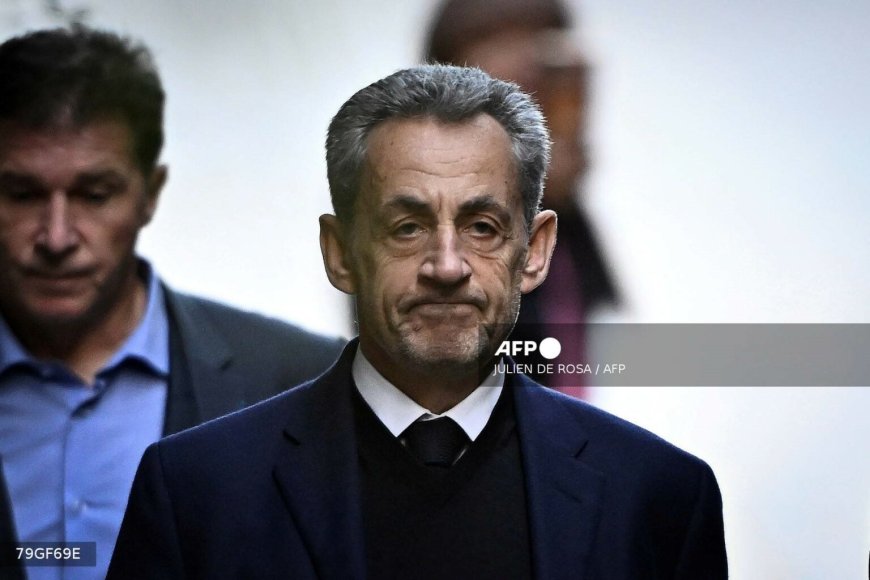Court frees ex-French president Sarkozy from jail pending appeal

Former French President Nicolas Sarkozy was on Monday ordered to be released from prison pending an appeal hearing over alleged Libyan campaign funding.
During a court session earlier in the day, prosecutors supported the 70-year-old’s request for release after he had spent 20 days in jail, a period the former president described as a “nightmare.”
A lower court in September found the right-wing politician, who served as head of state from 2007 to 2012, guilty of seeking funding from Muammar Gaddafi’s Libya for his 2007 presidential campaign and sentenced him to five years in prison.
He began serving his sentence on October 21, becoming the first former head of an EU member state to be incarcerated.
His lawyers swiftly appealed the verdict and sought his release.
Sarkozy was expected to leave La Santé prison in Paris later on Monday. The appeal hearing has been scheduled for March.
Appearing via video link from prison during the hearing, Sarkozy, dressed in a dark blue jacket and flanked by his lawyers, said being jailed was “gruelling.”
It’s hard, very hard, certainly for any prisoner. I would even say it’s gruelling,” he said, thanking prison staff who, according to him, “showed exceptional humanity and made this nightmare, because it is a nightmare, bearable.”
Prosecutor Damien Brunet also requested that Sarkozy’s application for release be granted.
“The risks of collusion and pressure on witnesses justify the request for release under judicial supervision,” he said.
In court to support Sarkozy were his wife, singer and model Carla Bruni-Sarkozy, and two of his sons.
The lower court in late September had ordered Sarkozy to begin his jail term immediately, even if he appealed, citing the “exceptional gravity” of the conviction.
However, with the appeal now pending, Sarkozy is again presumed innocent, and the court reassessed whether pre-trial detention was necessary.
Under French law, a person can only be detained if no other measures can ensure the preservation of evidence, prevent witness tampering, stop flight or reoffending, or protect the individual concerned.
At La Santé prison, the former president was held separately from the general prison population, with two bodyguards occupying a neighbouring cell to ensure his safety.
Prison wardens criticised the arrangement as an “insult” to their profession, but Interior Minister Laurent Nuñez defended it as necessary given Sarkozy’s “status” and “the threats against him.”
Late last month, Justice Minister Gérald Darmanin visited Sarkozy in prison, despite warnings from France’s top prosecutor, Rémy Heitz, that such a move could “undermine the independence of magistrates” ahead of the appeal.
Sarkozy is the first French leader to be jailed since Philippe Pétain, the Nazi collaborationist head of state imprisoned after World War II.
Last week, his social media account shared a video showing piles of letters, postcards, and packages sent to him — some containing collages, chocolate bars, or books.
On the day he entered prison, a large crowd gathered outside his home, singing the national anthem and urging him to “come back soon.”
Sarkozy has faced a series of legal troubles since losing his re-election bid in 2012 and has already been convicted in two other cases.
In one, he served a sentence for corruption — over attempting to secure favours from a judge — under house arrest with an electronic ankle tag, which was later removed.
In another, France’s top court is expected to rule later this month on accusations of illegal campaign financing during his failed 2012 re-election bid.
In the so-called “Libyan case,” prosecutors allege that Sarkozy’s aides struck a deal with Gaddafi in 2005 to illegally fund his 2007 campaign.
Investigators believe that, in return, Gaddafi was promised help restoring his international image after Tripoli was blamed for the 1988 Lockerbie bombing and another over Niger in 1989, both of which killed hundreds of passengers.
The court convicted Sarkozy of criminal conspiracy over the plan but did not find that he personally received or used the funds for his campaign.
AFP

 admin
admin 


